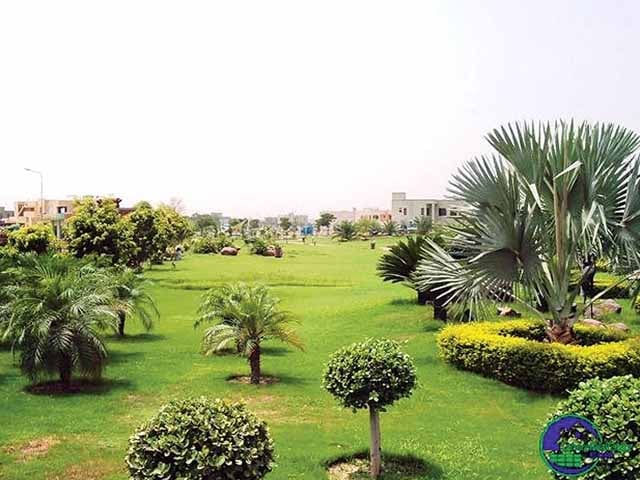Lahore: The growing trend of plantation of non-native plants in Punjab is increasing threats to native plants and wildlife.
Exotic plants and trees are also preferred for beautification of houses and housing schemes in big cities, due to which nurseries now show an abundance of exotic plants. Experts say that alien plants have put many native plant species at risk of extinction.
Punjab currently has hundreds of plant nurseries where apart from local plants, foreign plants are also sold. Some types of exotic plants are for indoor use, these plants make the environment of the house and room pleasant and are also used for decoration, some exotic plants are planted in house yards, gardens and green belts. However, among these foreign plants illegally imported into Pakistan, there are many that cause various diseases, including rashes and asthma, and are also considered harmful to local birds, insects, crops and plants.
Foreign plants were imported from China, Thailand, Holland, India, Sri Lanka and European countries. These exotic plants include aglomina, lucky bimbo, anthonium, bonsai, canary palm, phoenix sylvesta, capernesia, box plant, ilix plant and olive etc.
Patuki Tehsil of Punjab has the highest number of nurseries. Muhammad Zeeshan, the owner of a local nursery, while talking to The Express Tribune, said that the demand for exotic plants is high at present, people prefer exotic plants to decorate their gardens, roads, parks, house roofs. The main reason for this is that these plants grow quickly and look beautiful.
He said that most of the plants are imported, but there are a few whose seeds and seeds are imported. The price of these plants ranges from one thousand to one lakh rupees, while some plants are worth millions of rupees.
Regarding how foreign plants are imported into Pakistan, former Director General of Plant Protection Department, Dr. Waseemul Hasan, told The Express Tribune that there is no ban on the import of any foreign plant, any person fulfilling the legal requirements. Can import foreign plants.
He said that the government of the country from which the plants are to be imported provides the details of these plants, the environment in which these plants are grown, the temperature they need, the type of fruits or fruits on these plants. Apart from flowering, what insects attack these plants?
Dr Waseemul Hasan says that in the context of these details, the local environment, climate and the place where the plants are to be grown are analysed. If the department believes that our environment may be affected by the alien plants, or that those plants cannot grow in our environment and that the insects attacking these plants may harm our native crops and plants, then Import of such plants is not allowed.
The government’s policy is in place but it is a fact that millions of plants of many species have been illegally imported into Pakistan in the past years due to which our local species, environment and herbs have been damaged and many diseases have also arisen. Is.
There is no formal record of exotic plants in Pakistan, but it is estimated that there are more than 700 species of exotic plants, many of which have become a threat to native flora and fauna. The most important among them is mulberry, which causes allergies in humans. Similarly, the kekar tree has affected the growth of many native herbs including acacia and shesham trees. Imported water ferns and gills from South America have damaged the aquatic ecosystem of Indus, while imported conocarpus from Africa has caused pollen allergies and asthma.
Dr. Asad Shabbir, a former professor in the Department of Botany of Punjab University, who is currently teaching as a botanist in a government university in Sydney, Australia, told The Express Tribune that some non-native plants are affecting our environment. There are negative effects, these trees destroy biodiversity. It poses threats to many species of insects and affects the pollination process in plants. This is the reason why many species of native trees are disappearing and facing extinction due to these non-native plants and trees.
Conocarpus is not at all suitable for our local climate, he added. Conocarpus also adversely affects the growth of other trees while birds also do not use these trees for their habitat and breeding.
Dr. Asad Shabbir says that when exotic plants are cultivated elsewhere, they often clash due to unfavorable climate and mismatched temperaments. Therefore, before introducing flora from another region, experiments should be done on it and their disadvantages and advantages should be analysed.
Fahad Malik, an activist for the protection of environment and wildlife in Pakistan, says, “People often ask why dragonflies, butterflies, bees are not seen in our environment, while parrots, minas, bulbuls and other birds are extinct.” If we are going, the main reason for this is that where these species are harmed by other people, the main reason for their extinction is the destruction of their habitat. Fahad Malik said that ratotes like to build nests on local trees. When the native trees were gone, the parrots fled from us.
He said that research is being done on local trees, plants and herbs in neighboring countries India, Bangladesh, Nepal, China and Iran. In these countries, research is being done to adapt the local flora to today’s environmental changes to save them from extinction, but unfortunately, no research has been done in this regard in Pakistan, nor has any government. has been a priority.
(function(d, s, id){
var js, fjs = d.getElementsByTagName(s)[0];
if (d.getElementById(id)) {return;}
js = d.createElement(s); js.id = id;
js.src = “//connect.facebook.net/en_US/sdk.js#xfbml=1&version=v2.3&appId=770767426360150”;
fjs.parentNode.insertBefore(js, fjs);
}(document, ‘script’, ‘facebook-jssdk’));
(function(d, s, id) {
var js, fjs = d.getElementsByTagName(s)[0];
if (d.getElementById(id)) return;
js = d.createElement(s); js.id = id;
js.src = “//connect.facebook.net/en_GB/sdk.js#xfbml=1&version=v2.7”;
fjs.parentNode.insertBefore(js, fjs);
}(document, ‘script’, ‘facebook-jssdk’));


